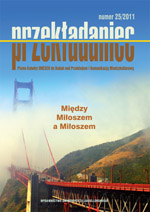Miłosz a amerykańska awangarda: od Pounda do Ashbery’ego
MIŁOSZ AND AMERICAN AVANT-GARDE: FROM POUND TO ASHBERY
Author(s): Paweł MarcinkiewiczSubject(s): Language and Literature Studies
Published by: Wydawnictwo Uniwersytetu Jagiellońskiego
Keywords: : Miłosz; avant-garde; Pound; ideogram; fragmentarization; synecdochic space; Ashbery; scenic mode; unheimlich; “really real”
Summary/Abstract: Miłosz was an avant-garde poet who systematically realized his program of rejuvenating mid-twentieth-century Polish poetry: he chose the most appropriate methods and strategies to cure the maladies of Romantic and nationalistic discourses, whose extension seemed urgent in the post-war reality. Although finally he became very critical of avant-garde poetics, such as Ezra Pound’s, his initial, restoring impulse came from the Poundian source: the need to “make it new.” Miłosz’s poetry of the 1970s developed Pound’s formal inventions, particularly the “ideogrammatic method,” generating meanings by contrasting the poem’s fragments. Although the Polish poet often commented critically on the achievements of the American avant-garde of the mid-twentieth century, in fact he admired their artistic freedom. However, he realized that he himself could not contradict the “poetics of salvation” he had been following for years. The world presented in Miłosz’s late poems is not obvious. Its most astonishing feature is the perspective from which the narrator addresses the reader: the almost mystical space, timeless and unspeakable, where the dead meet the living, has nothing to do with a picture of the world based on mimesis. Miłosz’s “second space” has a lot in common with the “real reality” designed by the surrealists, which John Ashbery evokes in his recent poems. Both poets reach a similar mystical point, where the word touches on the mystery.
Journal: Przekładaniec.
- Issue Year: 2011
- Issue No: 25
- Page Range: 121-141
- Page Count: 21
- Language: Polish

